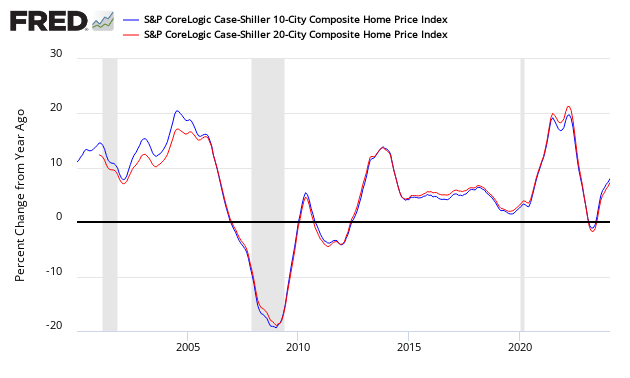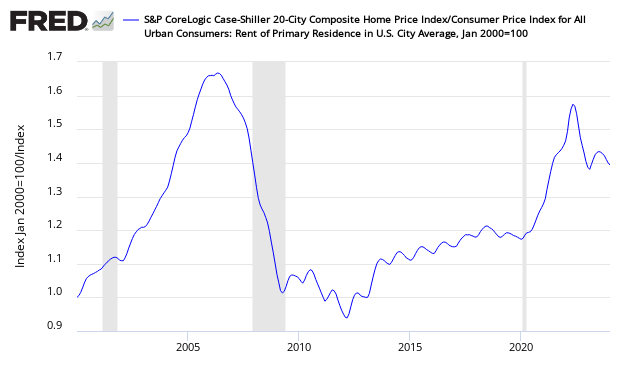Case-Shiller 20 City Home Price Index July 2017 Now At 5.8 % Year-Over-Year Growth
The non-seasonally adjusted Case-Shiller home price index (20 cities) year-over-year rate of home price growth grew from 5.7 % to 5.8%. The index authors stated "Consumers, through home buying and other spending, are the driving force in the current economic expansion."

Analyst Opinion of Case-Shiller HPI
Many pundits believe home prices are back in a bubble. Maybe, but the falling inventory of homes for sale keeps home prices relatively high. I continue to see this a situation of supply and demand. It is the affordability of the homes which is becoming an issue for the lower segments of consumers. It should be noted that the rate of year-over-year increased peaked in February 2017 at 5.9 %, and has declined every month since until this month and is currently at 5.82 %.
- 20 city unadjusted home price rate of growth grew 0.2 % month-over-month. [Econintersect uses the change in year-over-year growth from month-to-month to calculate the change in rate of growth]
- Note that Case-Shiller index is an average of the last three months of data.
- The market expected:
| Consensus Range | Consensus | Actual | |
| 20-city, SA - M/M | 0.1 % to 0.4 % | 0.4 % | +0.3 % |
| 20-city, NSA - M/M | +0.7 % | ||
| 20-city, NSA - Yr/Yr | 5.8 % to 5.9 % | 5.9 % | +5.8 % |
S&P/Case-Shiller Home Price Indices Year-over-Year Change

Comparing all the home price indices, it needs to be understood each of the indices uses a unique methodology in compiling their index - and no index is perfect.
The way to understand the dynamics of home prices is to watch the direction of the rate of change. Here home price growth generally appears to be stabilize (rate of growth not rising or falling).
There are some differences between the indices on the rate of "recovery" of home prices.
A synopsis of Authors of the Leading Indices:
Case Shiller's David M. Blitzer, Chairman of the Index Committee at S&P Indices:
Home prices over the past year rose at a 5.9% annual rate. Consumers, through home buying and other spending, are the driving force in the current economic expansion. While the gains in home prices in recent months have been in the Pacific Northwest, the leadership continues to shift among regions and cities across the country. Dallas and Denver are also experiencing rapid price growth. Las Vegas, one of the hardest hit cities in the housing collapse, saw the third fastest increase in the year through July 2017.
While home prices continue to rise, other housing indicators may be leveling off. Sales of both new and existing homes have slipped since last March. The Builders Sentiment Index published by the National Association of Home Builders also leveled off after March. Automobiles are the second largest consumer purchase most people make after houses. Auto sales peaked last November and have been flat to slightly lower since. The housing market will face two contradicting challenges during the rest of 2017 and into 2018. First, rebuilding following hurricanes across Texas, Florida and other parts of the south will lead to further supply pressures. Second, the Fed's recent move to shrink its balance sheet could push mortgage rates upward.
CoreLogic believes low inventories are spurring rising home prices (July 2017 Data). Per Dr. Frank Nothaft, chief economist for CoreLogic and Frank Martell, president and CEO of CoreLogic stated:
In July, home price growth in the Pacific Northwest and mountain states led the nation with the highest appreciation rates. The sharp increase in prices in Washington and Utah has been especially striking, with home price growth in both states accelerating by 3 percentage points since the beginning of this year.
Home prices in July continued to rise at a solid pace with no signs of slowing down. The combination of steadily rising purchase demand along with very tight inventory of unsold homes should keep upward pressure on home prices for the remainder of this year. While mortgage interest rates remain low, affordability cracks are emerging as over a third of U.S. top cities are now overvalued.
The National Association of Realtors says home sales prices continue to increase (August 2017 data):
Lawrence Yun, NAR chief economist, says the slump in existing sales stretched into August despite what remains a solid level of demand for buying a home. "Steady employment gains, slowly rising incomes and lower mortgage rates generated sustained buyer interest all summer long, but unfortunately, not more home sales," he said. "What's ailing the housing market and continues to weigh on overall sales is the inadequate levels of available inventory and the upward pressure it's putting on prices in several parts of the country. Sales have been unable to break out because there are simply not enough homes for sale."
Added Yun, "Some of the South region's decline in closings can be attributed to the devastation Hurricane Harvey caused to the greater Houston area. Sales will be impacted the rest of the year in Houston, as well as in the most severely affected areas in Florida from Hurricane Irma. However, nearly all of the lost activity will likely show up in 2018."
According to President William E. Brown, a Realtor® from Alamo, California, the housing market continues to recover from the depths of the financial crisis. However, the significant household wealth many homeowners have accumulated in recent years through rising home values could be at risk if any of the proposed tax provisions follow through with attempts to marginalize the mortgage interest deduction and eliminate state and local tax deductions.
"Consumers are smart and know that any attempt to cap or limit the deductibility of mortgage interest is essentially a tax on homeownership and the middle class," said Brown. A study commissioned by NAR(link is external)found that under some tax reform proposals, many homeowners with adjusted gross incomes between $50,000 and $200,000 would see an average tax increase of $815, along with home values shrinking by an average of more than 10 percent. An even steeper decline would be seen in areas with higher property and state income taxes. Congress must keep homeowners in mind as it looks towards tax reform this year."
Black Knight Financial Services (formerly known as Lender Processing Services) July 2017 home price index Up 0.5 Percent for the Month; Up 6.2 Percent Year-Over-Year. Note that Black Knight uses the current month closings only (not a three-month average like Case-Shiller or a weighted average like CoreLogic), excludes short sales and REOs, and is not seasonally adjusted.
Econintersect publishes knowledgeable views of the housing market.
Caveats on the Use of Home Price Indices
The housing price decline seen since 2005 varies by zip code - and seems to have ended somewhere around the beginning of the 2Q2012. Every area of the country has differing characteristics. Since January 2006, the housing declines in Charlotte and Denver are well less than 10%, while Las Vegas home prices had declined almost 60%.
Each home price index uses a different methodology - and this creates slightly different answers.
The most broadly based index is the US Federal Housing Finance Agency's House Price Index (HPI) - a quarterly broad measure of the movement of single-family house prices. This index is a weighted, repeat-sales index on the same properties in 363 metro centers, compared to the 20 cities Case-Shiller.
The US Federal Housing Finance Agency also has an index (HPIPONM226S) based on 6,000,000 same home sales - a much broader index than Case-Shiller. Also, there is a big difference between home prices and owner's equity (OEHRENWBSHNO) which has been included on the graph below.
Comparing Various Home Price Indices to Owner's Equity (blue line)


The affordability factor favors rental vs owning.
Price to Rent Ratio - Indexed on January 2000 - Based on Case-Shiller 20 cities index ratio to CPI Rent Index

Disclosure: None.





